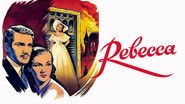ElMaruecan82
"Last night, I dream I went to Manderley again." This is the narration, murmured by Joan Fontaine's soft voice and inviting us for a posthumous tour over the English countryside, to the local manor that turned into a ghostly no man's house, surrounded by dark and brooding trees enveloping the place with an aura of sacred danger like some monster's claws over a precious catch. What is with that Manderley that inspired that dream anyway? The answer is of course in the title, it's all about "Rebecca". In fact, there's not a single element that belongs to the film or to the original novel written by Daphne du Maurier and that can be defined with the economy of that name-calling. Manderley was the place Rebecca lived. Maxim de Winter (Laurence Olivier) is Rebecca's widower. Mrs. Danvers (Judith Anderson) is her former governess. And Joan Fontaine suffers from the most ungrateful status as she's not even given a first name, she's only known as the "second Mrs. De Winter" she's not even Rebecca's rival because it's a lost fight, mentioning her in the same breath than Rebecca is like pronouncing the name of God in vain.So, the whole movie is overshadowed by Rebecca's aura, it's like the black-and-white photography, drawn through powerful contrasts, was just some decoy containing the shadowy presence of Rebecca, likely to commit an intrusion at any time, by means of a memory, an evocation, a revelation or a confession. There's a moment where Fontaine asks Maxim's best friend (Reginald Denny) about Rebecca, all he can say is that she was the most beautiful creature he ever saw. It takes some superhuman talent to convince us that Fontaine's not as beautiful as Rebecca, however she looked. As the shy, hapless and desperate-to-please Mrs. De Winters, Fontaine is vital to the credibility of the story because through her behavior, she's the plain that gives prominence to the mountain.And 'plain' is the word, it is the mark of a very subtle talent to take distance from the usual strong-minded, glamorous and independent heroines played by the likes of Bette Davis and Katherine Hepburn and create such a fragile, delicate and mild-mannered woman, begging for friendship rather than love, in awe of her husband and in total fear from Mrs. Danvers, the ominous governess who never misses an opportunity to remind what kind of a woman Rebecca was. It's a real psychological torture-game operating on Mrs. De Winter's head and frail shoulders and she hardly finds comfort in Maxim who seems to be constantly preoccupied and absent. Olivier seems rather uncomfortable in the role, but while the story unfolds, we slowly understand the reason of his emotional nonchalance and the no-less odd attraction to his new wife. Of course, even the answers belong to Rebecca.Daphne du Maurier was a woman who enjoyed isolation, not just for work but also as a way to contemplate her freedom and question her identity. This distance from the world predisposed her for fascination, for the ability, as a 'first person' to be haunted by someone, and it often happened to be a woman, or her memory, sometimes even a vague idea was enough. Through her fertile imagination and ambiguous sexuality, she managed to translate this power into a splendid Gothic-tale whose risqué subjects forced Hitchcock to make a few changes. But he faithfully, albeit at times not too subtly, respected the original material and his camera-work conveyed the ghostly presence of Rebecca. Even Danvers who seemed to have had a privileged relationship (of platonic nature in the film) seems to glide over the place, as if she was possessed by the soul of her deceased mistress.Hitchcock was a craftsman and his camera loved the faces of Anderson and Fontaine, the cinematography also accentuates the feeling of an impending danger, and the acting was enriched by the presence of a youngish George Sanders and Leo G. Carroll who would also reveal one thing or two about good old Rebecca. It was Hitchcock's first Hollywood movie and needless to say the trial was conclusive. The film won the Oscar for Best Picture, over classics like "The Grapes of Wrath" and "The Great Dictator", without winning any of the major awards in the directing, acting and writing department, but I guess that's what can be said about "Rebecca", it is a great picture with the looks, the mystery, the acting and everything one could ask for.I only wish it didn't overplay the melodramatic violins and a succession of twists and revelation at the end satisfy the mind, but don't fool us either as Olivier didn't play the kind of roles that deserved a happy ending by Hitch' standards. The film redeems itself with some last-minute thrills but Hitchcock would make subtler films. Still, "Rebecca" holds up well today because there's that uniqueness in the heroine and this extraordinary presence, the fascination over the fact that the most fascinating character is actually absent. The American Film Institute recognized Mrs. Danvers as the thirty-first villain of all time, but I wonder if Rebecca on her own way was the real antagonist and would have deserved that title a little more. Indeed, we never see her, but we can feel her actions, just like the Man in "Bambi" who also nominated in the same list, an invisible but an undeniably evil presence.Now, does Rebecca win or lose as an antagonist? Well, from the opening line, the one about that dream, one can guess that you can never totally get rid of Rebecca, and maybe for that reason, despite the film's flaws and that it's never mentioned at along with "Vertigo", "Psycho", "North by Northwest" or "Rear Window" as Hitch' best, we can never totally ignore "Rebecca".








